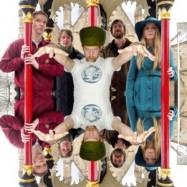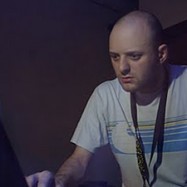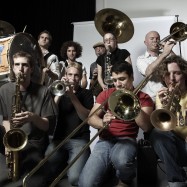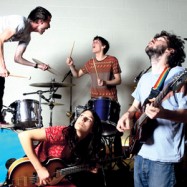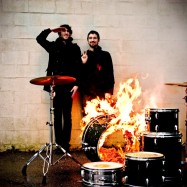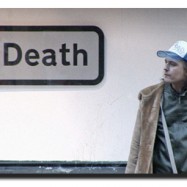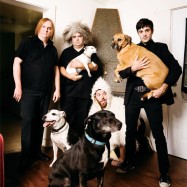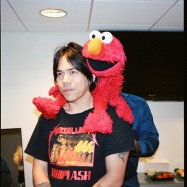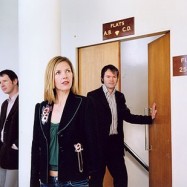Trembling Bells with Bonnie ‘Prince’ Billy / Muldoon’s Picnic, Trinity Centre, 3rd
Will Oldham has grown increasingly unable to resist a collaboration in recent years, and in teaming with prolific Glaswegian folk-rock troupe Trembling Bells he’s made his most inspired choice yet. Over three albums the formidable voice of Lavinia Blackwall and jazz, rock and psych-tinged arrangements of Alex Neilson have reworked classic Fairport/String Band folk revivalism into wild, freewheeling new shapes. Oldham’s trademark creased, careworn quiver dovetails splendidly with Blackwall and acapella ensemble Muldoon’s Picnic on the teaser EP for the full-length The Marble Downs LP, tackling English and Scottish traditionals, bawdy folk duets and sundry other tangents with a sense of fun and exploration. Should be a rollicking good time.
Lawrence Of Belgravia + Q & A with Lawrence and Paul Kelly, Cube, 7th
One of the most fascinating and unique characters in the monochrome world of 1980s indie Britain, Lawrence Hayward’s eccentricities and foibles are much documented (David Cavanagh’s Creation history ‘My Magpie Eyes Are Hungry For The Prize’ essays the period nicely) and can obscure the bigger picture; one of a reclusive, compulsive pop dreamer who spent a decade making elliptical, muted music that could go technicolour almost without warning. He later detoured wildly into gleeful, studied glam pastiche that resulted in at least one classic album (‘Denim On Ice’) and the sort of cultish acclaim that gets you films like this about your life. The result gets a viewing in the Cube’s cosy space with Lawrence and Saint Etienne film-maker (and former guitarist) Paul Kelly fielding questions afterwards. A quiet, beautifully framed observation of a life outside the margins looking in.
Francois & The Atlas Mountains / Stranded Horse, Clwb Ifor Bach, 9th
Being woken by the charming Balearic pop of Francois & The Atlas Mountains’ ‘Les Plus Beaux’ on the radio was one of the nicer surprises I’ve had on a work-day in a while, not least because of how incongruous it seemed that the cute Franco-Bristolian shamblers of 2006 had popped up on Domino Records and radio playlists in 2012. Their stealthy progress is testament to evolution rather than revolution; the hints of Malkmus, Richman and Hayman detectable in Francois’ scratchy, lopsided songs back then can still be heard now, albeit dressed in brighter, more musically adventurous coats. The romantic, nostalgic europop of Jens Lekman or Victoria Bergsman and a warm palette of smoothly integrated global influences has risen to the surface; hearts will be won with this long-overdue return.
Shabazz Palaces / DJ Moneyshot vs Rackbeat & Bar-Low, Start The Bus, 11th
Being Sub Pop’s First Hip-Hop Act in an era when its roster is as fragmented and nebulous as it’s ever been doesn’t give Ishmael Butler the novelty cachet it once might, but Shabazz Palaces’ debut proper Black Up was still a take-notice rap album of rare import. The Seattle veteran’s amorphous arrangements hark back in a small way to his early 90s jazz-rap outfit Digable Planets, but the often jaw-dropping clashes of dense, politicised, hyper-literate lyrical clusters and harsh, modernist robo-funk suggest the eye of a storm that draws Cannibal Ox, Anti-Pop Consortium, cLOUDDEAD, Flying Lotus and DJ Krush into its path.
Andy Stott / Roly Porter & Flicker / Vessel (DJ Set), Cube, 12th
If Jamie Teasdale (now AKA Kuedo) took the twinkling, insidious darkside melodies on the demise of Vex’d, his erstwhile partner Roly Porter contented himself with the real dark stuff. His Aftertime full-length creaks and groans with oppressive metallic weight, industrial drone and a textural heft that’s spacious and claustrophobic seemingly at once. Ben Frost is a fair comparison, if required. Heading up this storming Qu Junktions double bill is Andy Stott, who takes a similarly surgical approach to Porter but uses dub, techno, deep house and supremely brooding bass music as his components. The result is a hermetic, heavy-lidded meshing of Actress’ inversions of dancefloor tropes and Basic Channel minimalism. You want intense this month, this is where you’ll find it.
Esmerine / Eric Chenaux / Oran Mill, Cube, 13th
Instrumental group from Montreal, Godspeed/Silver Mt Zion affiliates… so far, so good, and so predictable. Not really, though; this is post-rock in the sense that Tortoise, Rachel’s, Clogs et al are, owing as much to Steve Reich and chamber music as to the quiet-loud build of so many indistinguishable earnest young men. Eddying pools of cello, marimba, piano and spare percussion, the balance between tense, contemplative pieces and moments of pin-drop beauty is expertly judged. Compatriot Eric Chenaux similarly juxtaposes modern composition and jazzy, improv-style arrangements with stately balladry; the results, particularly on 2008’s Sloppy Ground, can be disorientating and quite beautiful.
MXLX / Woolf / Stacking Chairs / Brandyman DJs, Undertone, 16th
NEPOTISM KLAXON! Yes, this is a Joy Collective co-promotion with magnificent humans Lesson No. 1, and as such we are duty bound to proclaim it GIG OF THE MONTH. Luckily, we would never lie to you, much, and herein lies all manner of beauteous noise, repetition, restless invention and sheer giddy fun. MXLX is Matt Loveridge, man of infinite musical tendrils whose work as Fairhorns, Klad Hest, Knife Liibrary and (most appropriately here) Team Brick takes in shuddering dancefloor stomps, decaying drone, blackened ambient noisescapes, modern composition, plainsong and whatever else he feels like. The MXLX mask sees him move back towards the lengthy drone/percussion/chant workouts of before, and it’s bracing, heady stuff. Much the same can be said of Casey Raymond’s homebrew techno, feverish guitar spasms and gleeful plunderphonics in the guise of Stacking Chairs, while Woolf should ably detonate the bridge between the two with urgent, chaotic no-fi punk, tumultuous DIY noise and the spirit of classic, vital riot grrrl. We are having fun here. Are you?
Japandroids / Cadence Weapon, Clwb Ifor Bach, 17th
Many will wake the morning after this gig with unexplained soreness in their upper arms. This will be because they spent Japandroids’ set involuntarily punching the air. They’re that sort of band; sweaty, committed full-tilt alt-punk epics of yearning, regret and nihilism cranked out somewhere between No Age’s sloppiness, Fang Island’s bro-chant inclusiveness and the blue-collar library card punk of Titus Andronicus. Clwb’s ground floor is made for nights like these; if you caught Fucked Up’s staggering debut Cardiff show there you’ll know what to expect of this one. That the support is brilliant Toronto MC Cadence Weapon – backpacker, party-starter and braggart in one super-confident whole – is as utterly incongruous as it is excellent. Unmissable, right? RIGHT.
Harvey Milk / Hey Colossus, Croft, 23rd
What with this and a Melvins show in consecutive nights, the Croft may well crumble to ruins by the end of April. Treacle-thick, agonisingly slow and often utterly bleak in tone, it’s sort of a mystery how HM end up being such a fun ride; the subtle variations in the formula (blooze-rock stormers, heads-down Motorhead punk, tar-black humour) draw you in and let the monolithic guitar sludge do the rest. Somewhere between the Milk’s grim riffmonsters and Butthole Surfers’ acid-crazed heart-of-darkness murk lie London goons Hey Colossus, an amp-torturing live unit akin to pals Part Chimp’s splendidly gonzo sonic attack. Perfect bedfellows for a night of leery noise.
Saint Etienne, The Gate, 25th
Why is it that Saint Etienne are my favourite pop group of the last 20 years? It has to do with an all-consuming love for pop music; across genres, nationalities, decades. It’s a simultaneous scholarly, journalistic eye for nuance and detail and trivia (cf. Neil Tennant) and unabashed wonder at pop’s continued ability to leave you blissful and shivering at the smallest intimate moments or the most widescreen, inclusive ones. It’s the art (conceptual films eulogising London past, design, sleevenotes-as-essays both delicious and pretentious) and the artifice (trashy, ecstatic europop production, shoddy miming, MOR affectations). It’s some of the best songtitles ever and THE best pop songs of the 1990s. They don’t make them like Saint Etienne anymore. But Saint Etienne, thankfully, still do.
Soe’za / Motes, Café Kino, 25th
Fifteen years strong, Soe’za may record and play only sporadically these days but their strange, befuddling brew remains something well worth investigating. On one hand the taut math-rock guitars and clipped, declamatory vocals are in an antsy post-hardcore tradition, but add to that rolling double-drumming, blaring french horn, counter vocals worthy of Stereolab and a tumbling, complex prog/Beefheart songwriting streak (labelmates Bilge Pump do the same, with lesser resources) and the infinite possibilities of a group of musicians free to play around with whatever they choose become joyfully clear. Cram them onto the stage in Cafe Kino’s excellent basement space, add the minimalist anti-rock of Motes and you’ve a quiet gem on your hands.
High Places, Ten Feet Tall, 29th
Newcomers to High Places at last year’s Original Colors might be forgiven for hearing over-familiar notes in their cut & paste electronic pop; it certainly took deliberate steps towards heavier beats and gave stylistic nods to techno and two-step. The duo haven’t left behind the home-recorded charm that characterised their earlier records, though, nor the endearing mix of sloppy, rough-edged arrangement and precise, clean, optimistic sing-song vocals. At their best they sift the simplicity and hope of bedroom indie pop, the kind of DIY experimentalism born of ambition without resources and a clear-minded dancefloor nous and cherry-pick the best of all worlds in a way numerous other NYC duos fail to do.
Papa M / The Liftmen / The Balky Mule, Cube, 31st
This is a fine surprise; the re-emergence of David Pajo in his own right, just when you’d be forgiven for thinking he’d given it all up to a life as hired-gun bassist (Interpol, Zwan), questionable revival metal (Dead Child) and the odd Slint reunion show. Papa M was, of course, one of the three iterations of the ‘M’ name Pajo adopted for innumerable LPs and EPs between roughly ’95 and ’04, and for the most part marked a transition from the plangent post-rock excursions of Live From A Shark Cage to the dusty countrified laments of Whatever, Mortal. Either version of Pajo is a welcome sight, one man, his guitar and an array of beautiful, lonesome sounds. Top-drawer local support too, itchy post-punk and DIY lo-fi folk experimentation.
Islet / Hail! The Planes / Mars To Stay, Clwb, 31st
A no-brainer to finish on, then. Islet should not, must not, fall prey to the eternally frustrating scenario of the flat home-town gig, that puzzling phenomenon where Cardiff audiences’ familiarity with a band manifests in shrugged-shouldered indifference, laziness. Islet deserve undying enthusiasm more than ever in a year when the leap to debut album proper was made with embarrassing ease. If Illuminated People made few abrupt attitudinal changes from the two EPs, it’s because their methods were already so fully-formed. They’re a better live band than ever, too, a four (or five) headed hydra teasing out the songs into new, wild shapes with telepathic understanding. They also pick some cracking supports, and here expose two bands to the sort of wider audience they deserve; Mars To Stay’s hushed, lo-fi Galaxie 500-isms are wisps of pop melody in clouds of hiss and guitar static, and Hail! The Planes’ folky post-rock has stealthily assumed a fine dramatic weight and grace. As clear a picture of the rude health of Cardiff’s experimental fringes as you’d want, and on payday too. Bargain.
